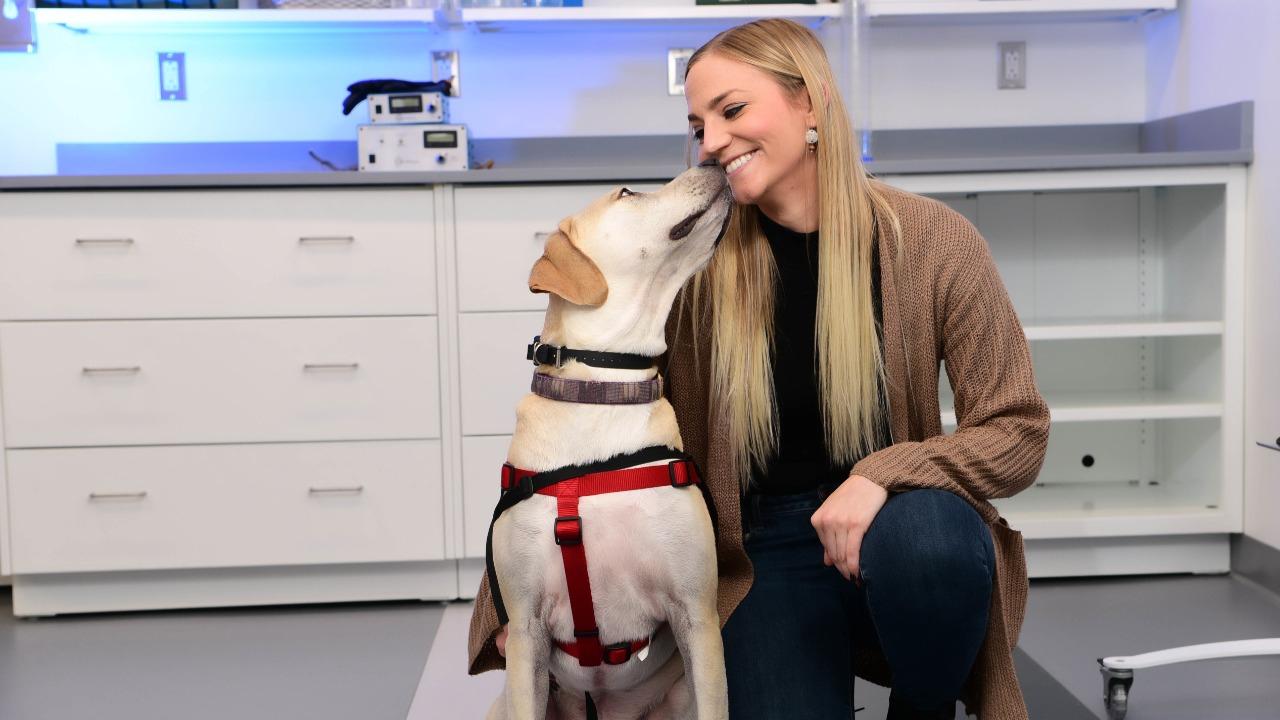Meet Annie, the service dog partner of PhD candidate Taylor Johnson
Two major things happened to Taylor Johnson five years ago that radically changed her life. Johnson moved to New Orleans to continue her education at Tulane University. She was also diagnosed with Ehlers Danlos Syndrome, ending a long medical journey to explain the myriad of symptoms that left her bedridden some days.
“I was by myself in a new city, and I was fainting five or six times a week,” Johnson said.
Johnson, now a PhD candidate in the Aging Studies program at Tulane University School of Medicine, began researching service dogs and came across a Louisiana organization that establishes dog training programs in correctional facilities. The Big House to Your House trains inmates to train and care for dogs. And that’s how she met Annie.
“We did one meet and greet and it was absolutely the perfect fit,” said Johnson. “The directors and trainers say they can match the dogs with personality traits in humans, and it’s crazy. It’s so true how they can really match a team together.”
Initially trained as a medical alert dog, Annie first learned how to sense when Johnson was about to faint. Her powerful nose could detect changes in Johnson’s saliva. She also learned to watch for a particular stance when Johnson feels her blood pressure drop.
“I cross my legs to get the blood flowing back up and Annie knows to come up into a support position to provide balanced assistance,” said Johnson. “Ideally, I should lay down, but if I’m not in a situation where I can do that, Annie can lead me to a chair or curb. She knows how to look for safe spots.”
Annie also knows how to go get Johnson’s phone if she needs to call for help. On days when Johnson is feeling extremely fatigued or experiencing a Postural Orthostatic Tachycardia Syndrome (POTS) flare, Annie can pull her ahead to keep her momentum going.
Johnson gets a lot of questions about her constant companion. EDS can be an invisible disability, and people often think Johnson is training Annie for someone else. Johnson hopes she and her four-legged teammate can help spread awareness about service dogs.
“You're not supposed to interact with a service dog at all,” said Johnson. “You shouldn't distract them, because they're always keyed into their handler. If I'm doing something where Annie is actively working and I need her, I will try to politely say, ‘She's working. She can't say hi, right now.’ But if I'm somewhere safe, either I'm sitting or I feel comfortable, I can tell her to go say hi. She knows that command. She’ll go and give a big, big hello. Then she comes right back, she snaps back in and she’s all work.”
Johnson hopes to complete her doctorate program next year and wants Annie to be by her side when she walks across the stage.
“She’s my right hand and she’s given me my safety and independence back,” said Johnson. “She’s just incredibly well behaved and sweet, even for service dogs. She really tugs at the heartstrings.”

